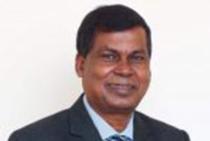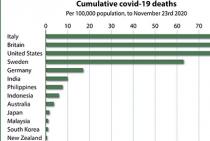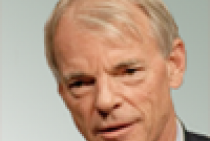The outbreak of a new war in the Middle East, together with a destructive tariff war, makes for a lethal combination in a sluggish world economy. Notwithstanding the possibility of a tentative ceasefire, the odds of imminent global recession have increased sharply. It is far too early to foretell how US entry into Israel’s war against Iran will affect global energy prices. ...But in one sense, the situation is reminiscent of Saddam Hussein’s invasion of Kuwait in August 1990, which led to a doubling of oil prices within three months. By Stephen S. Roach.
You are here
Results for Op-Ed Global Economics
Wednesday 25 June 2025
New Haven, USA
Sunday 1 June 2025
London, United Kingdom
In the months and years ahead, investors, business leaders, and policymakers will need to keep a close eye on capital flows, demographic shifts, and ideological realignments, all of which are ushering in a more fragmented and siloed world. While there is no way to eliminate extreme uncertainty, it can at least be managed. ...Amid so much volatility, decision-makers will have to focus on adaptability. - Dambisa Moyo
Monday 6 January 2025
Cambridge-MA, USA
Five years ago, a novel coronavirus was quietly spreading, already well on its way to causing a global pandemic that would expose deep vulnerabilities in the prevailing global economic model. Yet most of the lessons from that period have already been forgotten, leaving the world woefully unprepared for the next crisis. After two years of negotiations, the draft of a global pandemic treaty remains unsigned, and the seven million people killed directly by the virus have become mere statistics.
Friday 11 August 2023
Suva, Fiji
The Pacific Islands are now at a cliff edge. As a region, as countries and as peoples, we face some of the hardest and cruellest choices. Business as usual, more of the same and incremental improvements will be the surest way to disaster for the whole of our region. As our communities, our region struggles, this is a time to ask some hard questions...Do we have what it takes to implement policies and decisions at the pace and speed at which this is needed? By Professor Biman Prasad (article from a public speech during this week's Forum Economic Ministers Meeting in Suva, Fiji).
Wednesday 30 December 2020
London, United Kingdom
In the early stages of the COVID-19 pandemic, it was common to divide countries and their responses according to their political systems, with many attributing China’s success in controlling the virus to its authoritarianism. As of late 2020, however, it is clear that the real dividing line is not political but geographical. Regardless of whether a country is democratic or authoritarian, an island or continental, Confucian or Buddhist, communitarian or individualistic, if it is East Asian, Southeast Asian, or Australasian, it has managed COVID-19 better than any European or North American country. The fact remains that you were much likelier to die of COVID-19 in 2020 if you were European or American than if you were Asian. - By Bill Emmott
Tuesday 8 December 2020
Cambridge-MA, USA
According to the conventional wisdom, the twenty-first century will be characterized by the global shift from American hegemony to Sino-American rivalry. But a bipolar international order is neither inevitable nor desirable, and in fact, would be deeply unstable. Its emergence would heighten the risk of violent conflict and three of the biggest challenges facing humanity would either be ignored or made worse. We should start imagining and working toward alternative arrangements. - By Daron Acemoglu.
Monday 16 November 2020
Oxford, United Kingdom
The last time the world faced challenges as serious as those facing us now was in the period immediately following World War II. At that time there was an extraordinary burst of international institutional creativity, led by the United States. The late 1940s saw the creation of the IMF, the World Bank, the Marshall Plan, the United Nations, which the WHO joined in 1948, and the GATT, now the WTO. If countries in Asia want a multilateral system to survive, they need to promote, use and improve it. The G20 Summit in Riyadh on 20–21 November will provide an opportunity to push forward this agenda. By David Vines / East Asia Forum.
Monday 3 February 2020
New York, USA
Some fear that the timing of China’s coronavirus outbreak – at the start of the country's week-long New Year celebration, and in the middle of traditional school-break travels – will exacerbate the economic fallout from the epidemic. But three important factors may limit the virus’s impact on Chinese and global GDP. ...I expect that both the Chinese authorities and the World Health Organization will declare the epidemic to be under control by early April. By Shang-Jin Wei.
Tuesday 22 October 2019
Washington D.C., U.S.A
Although multilateralism is in crisis, different fates await the multilateral institutions that were created under the Bretton Woods Agreement 75 years ago. While the International Monetary Fund has found renewed relevance in a world of crises, the World Bank has suffered under the poor leadership of a parade of American men.
Tuesday 22 October 2019
London, United Kingdom
By broadening the nexus between economic interest and national security, Trump is encouraging the decoupling of the world’s two largest economies and the emergence of a bipolar world order led by rival hegemons. Beyond fragmenting the trade and financial system that has underpinned the global economy for decades, the stage would be set for a devastating conflict. By Paola Subacchi.
Tuesday 23 July 2019
Manchester, United Kingdom
In a well-functioning parliamentary system, the state budget is overseen by a group of elected authorities in a relatively transparent manner. No one person has the power to shape the process in self-serving ways. Embedding checks and balances into governance – particularly to limit the executive’s discretionary budgetary authority – is integral to accomplish the kind of structural transformation developing countries need if they are to create more stable, prosperous futures well beyond 2030. By Tania Masi, Roberto Ricciuti, Antonio Savoia, and Kunal Sen.
Tuesday 11 June 2019
Berlin, Germany
After three decades of moving toward a single global market governed by the rules of the World Trade Organization, the international order has undergone a fundamental change. The United States and China are locked in a tariff war that at first seemed to be about the bilateral trade balance, but has turned out to be about much more. Until recently, one could find hope in the fact that, despite frequent exchanges of threats, the two countries were negotiating. Not anymore. - By Joschka Fischer.
Thursday 2 May 2019
Stockholm, Sweden
The problem is staggering, even existential. Global emissions of greenhouse gases – especially carbon dioxide – are rapidly driving up global temperatures, transforming life as we know it. If those temperatures reach 2oC above pre-industrial levels, scientists warn, the results will be catastrophic. An international conference is called, under the auspices of the United Nations. Politicians declare that the world must curb CO2 emissions to avoid exceeding the 2oC threshold. And then nothing substantial happens. By Mats Persson.
Thursday 4 October 2018
1 comment
New Delhi, India
Whatever the reason for Asia’s profusion of strongmen, people and markets have gotten it wrong for too long. Strongman rulers are bad for democracy, and they are really bad for the economy. By Jayati Ghosh.
Tuesday 19 June 2018
Geneva, Switzerland
According to an old African proverb, “When elephants fight, it is the grass that suffers.” The same is true for full-blown trade wars: when major economies clash, developing countries will be among the hardest hit.
Monday 7 May 2018
From 1949, when Mao Zedong’s communists triumphed in China’s civil war, until the collapse of the Berlin Wall 40 years later, Karl Marx’s historical significance was unsurpassed. Nearly four of every ten people on earth lived under governments that claimed to be Marxist.... On the 200th anniversary of Marx’s birth on May 5, 1818, it isn’t far-fetched to suggest that his predictions have been falsified, his theories discredited, and his ideas rendered obsolete. So why should we care about his legacy in the twenty-first century? By Peter Singer
Monday 11 December 2017
New York, USA
Globalization, which was supposed to benefit developed and developing countries alike, is now reviled almost everywhere, as the political backlash in Europe and the US in recent years has shown. The challenge is to minimize the risk that the backlash will intensify, and that starts by understanding – and avoiding – past mistakes.
Monday 7 August 2017
Milan, Italy
National and international institutional frameworks must continue to guard against destructive actions by political leaders. In the final analysis, confidence in these institutions’ resilience – and in an eventual end to the current political dysfunction – is what markets seem to be banking on. by Michael Spence.
Saturday 10 June 2017
 Premium content
Premium content
New York, USA
After 16 years of negotiations, 11 Pacific island nations will sign the Pacific Agreement on Closer Economic Relations (PACER Plus) in Tonga on 14 June. By Daniel Gay. Inter-Regional Adviser on least developed countries, UN Committee for Development Policy Secretariat, New York.



















